Report on Leadership, Management, and Operations in Corus Company
VerifiedAdded on 2021/02/20
|15
|4020
|390
Report
AI Summary
This report provides an analysis of leadership and operations management within Corus, a European steel-making company. It begins with an introduction to management and operations, highlighting their importance. The report then delves into the roles and characteristics of leaders and managers, differentiating their functions and responsibilities. It explores various situational contexts, such as employee turnover and conflicts, and how leaders and managers should respond. Furthermore, the report examines leadership theories like situational, system, and contingency leadership, illustrating their practical application. The assignment also covers different approaches to operations management, including 'Just in Time', and analyzes the elements of the business environment that influence operational strategies. The report concludes with a summary of the key findings and references.
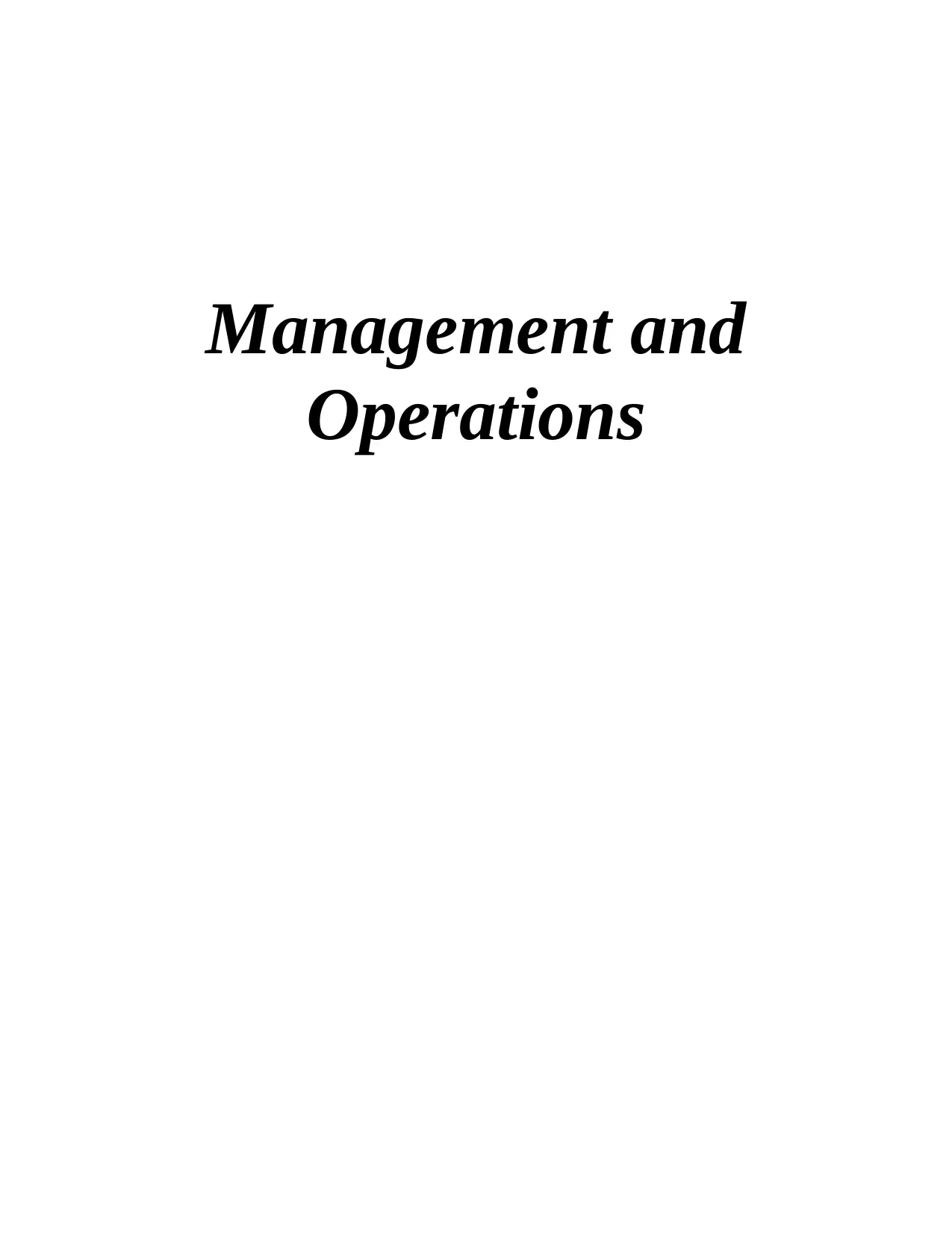
Management and
Operations
Operations
Paraphrase This Document
Need a fresh take? Get an instant paraphrase of this document with our AI Paraphraser

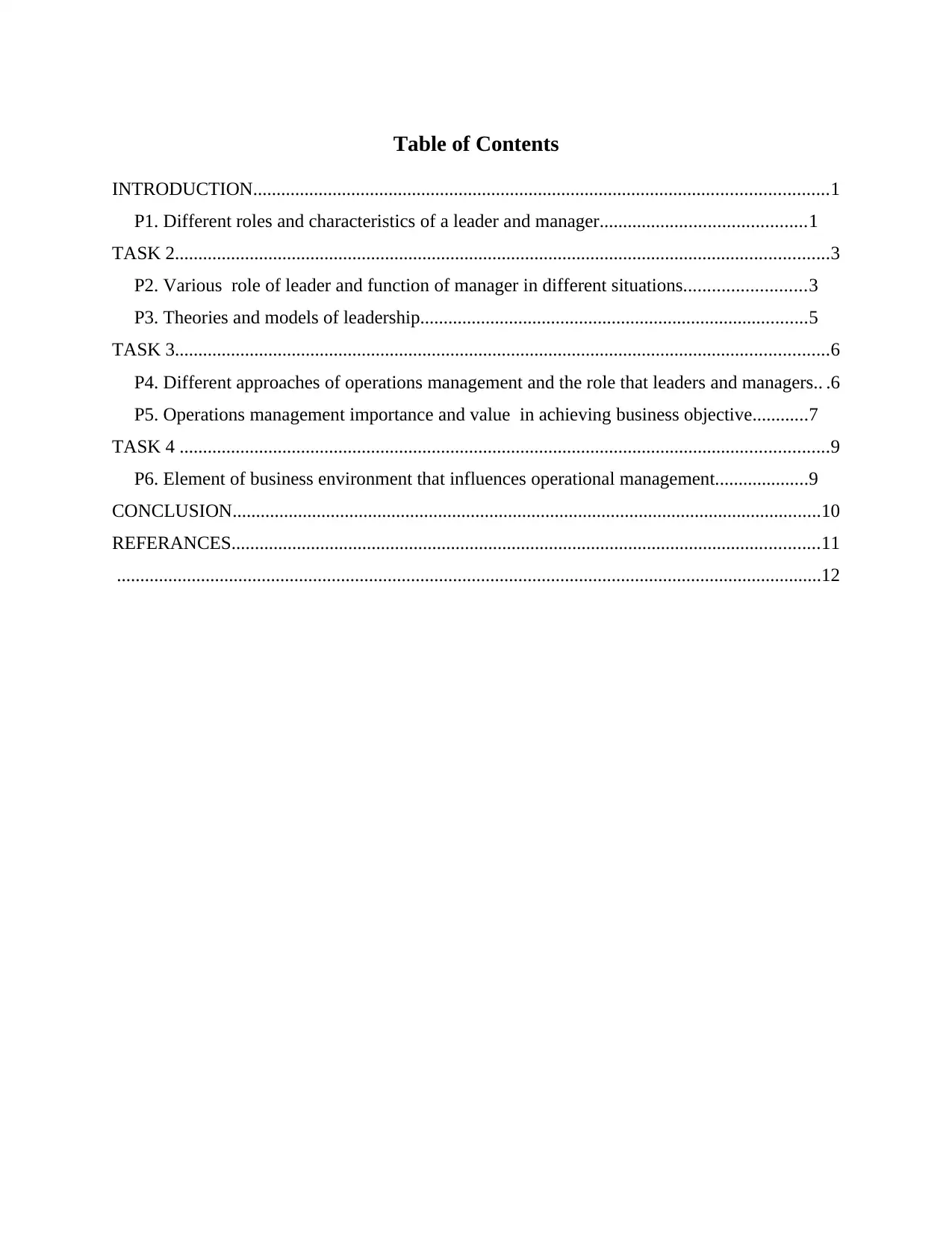
Table of Contents
INTRODUCTION...........................................................................................................................1
P1. Different roles and characteristics of a leader and manager............................................1
TASK 2............................................................................................................................................3
P2. Various role of leader and function of manager in different situations..........................3
P3. Theories and models of leadership...................................................................................5
TASK 3............................................................................................................................................6
P4. Different approaches of operations management and the role that leaders and managers.. .6
P5. Operations management importance and value in achieving business objective............7
TASK 4 ...........................................................................................................................................9
P6. Element of business environment that influences operational management....................9
CONCLUSION..............................................................................................................................10
REFERANCES..............................................................................................................................11
.......................................................................................................................................................12
INTRODUCTION...........................................................................................................................1
P1. Different roles and characteristics of a leader and manager............................................1
TASK 2............................................................................................................................................3
P2. Various role of leader and function of manager in different situations..........................3
P3. Theories and models of leadership...................................................................................5
TASK 3............................................................................................................................................6
P4. Different approaches of operations management and the role that leaders and managers.. .6
P5. Operations management importance and value in achieving business objective............7
TASK 4 ...........................................................................................................................................9
P6. Element of business environment that influences operational management....................9
CONCLUSION..............................................................................................................................10
REFERANCES..............................................................................................................................11
.......................................................................................................................................................12
⊘ This is a preview!⊘
Do you want full access?
Subscribe today to unlock all pages.

Trusted by 1+ million students worldwide
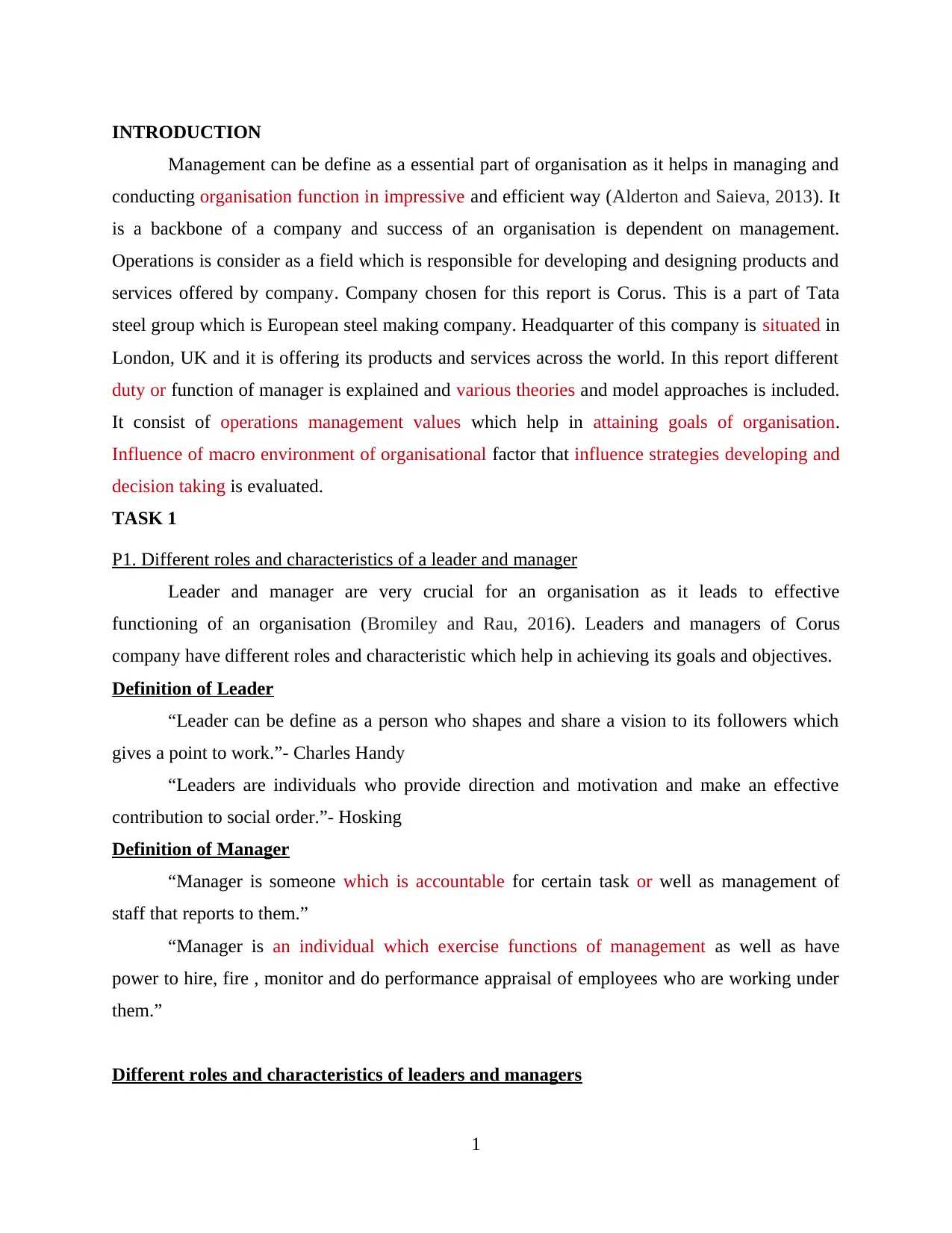
INTRODUCTION
Management can be define as a essential part of organisation as it helps in managing and
conducting organisation function in impressive and efficient way (Alderton and Saieva, 2013). It
is a backbone of a company and success of an organisation is dependent on management.
Operations is consider as a field which is responsible for developing and designing products and
services offered by company. Company chosen for this report is Corus. This is a part of Tata
steel group which is European steel making company. Headquarter of this company is situated in
London, UK and it is offering its products and services across the world. In this report different
duty or function of manager is explained and various theories and model approaches is included.
It consist of operations management values which help in attaining goals of organisation.
Influence of macro environment of organisational factor that influence strategies developing and
decision taking is evaluated.
TASK 1
P1. Different roles and characteristics of a leader and manager
Leader and manager are very crucial for an organisation as it leads to effective
functioning of an organisation (Bromiley and Rau, 2016). Leaders and managers of Corus
company have different roles and characteristic which help in achieving its goals and objectives.
Definition of Leader
“Leader can be define as a person who shapes and share a vision to its followers which
gives a point to work.”- Charles Handy
“Leaders are individuals who provide direction and motivation and make an effective
contribution to social order.”- Hosking
Definition of Manager
“Manager is someone which is accountable for certain task or well as management of
staff that reports to them.”
“Manager is an individual which exercise functions of management as well as have
power to hire, fire , monitor and do performance appraisal of employees who are working under
them.”
Different roles and characteristics of leaders and managers
1
Management can be define as a essential part of organisation as it helps in managing and
conducting organisation function in impressive and efficient way (Alderton and Saieva, 2013). It
is a backbone of a company and success of an organisation is dependent on management.
Operations is consider as a field which is responsible for developing and designing products and
services offered by company. Company chosen for this report is Corus. This is a part of Tata
steel group which is European steel making company. Headquarter of this company is situated in
London, UK and it is offering its products and services across the world. In this report different
duty or function of manager is explained and various theories and model approaches is included.
It consist of operations management values which help in attaining goals of organisation.
Influence of macro environment of organisational factor that influence strategies developing and
decision taking is evaluated.
TASK 1
P1. Different roles and characteristics of a leader and manager
Leader and manager are very crucial for an organisation as it leads to effective
functioning of an organisation (Bromiley and Rau, 2016). Leaders and managers of Corus
company have different roles and characteristic which help in achieving its goals and objectives.
Definition of Leader
“Leader can be define as a person who shapes and share a vision to its followers which
gives a point to work.”- Charles Handy
“Leaders are individuals who provide direction and motivation and make an effective
contribution to social order.”- Hosking
Definition of Manager
“Manager is someone which is accountable for certain task or well as management of
staff that reports to them.”
“Manager is an individual which exercise functions of management as well as have
power to hire, fire , monitor and do performance appraisal of employees who are working under
them.”
Different roles and characteristics of leaders and managers
1
Paraphrase This Document
Need a fresh take? Get an instant paraphrase of this document with our AI Paraphraser
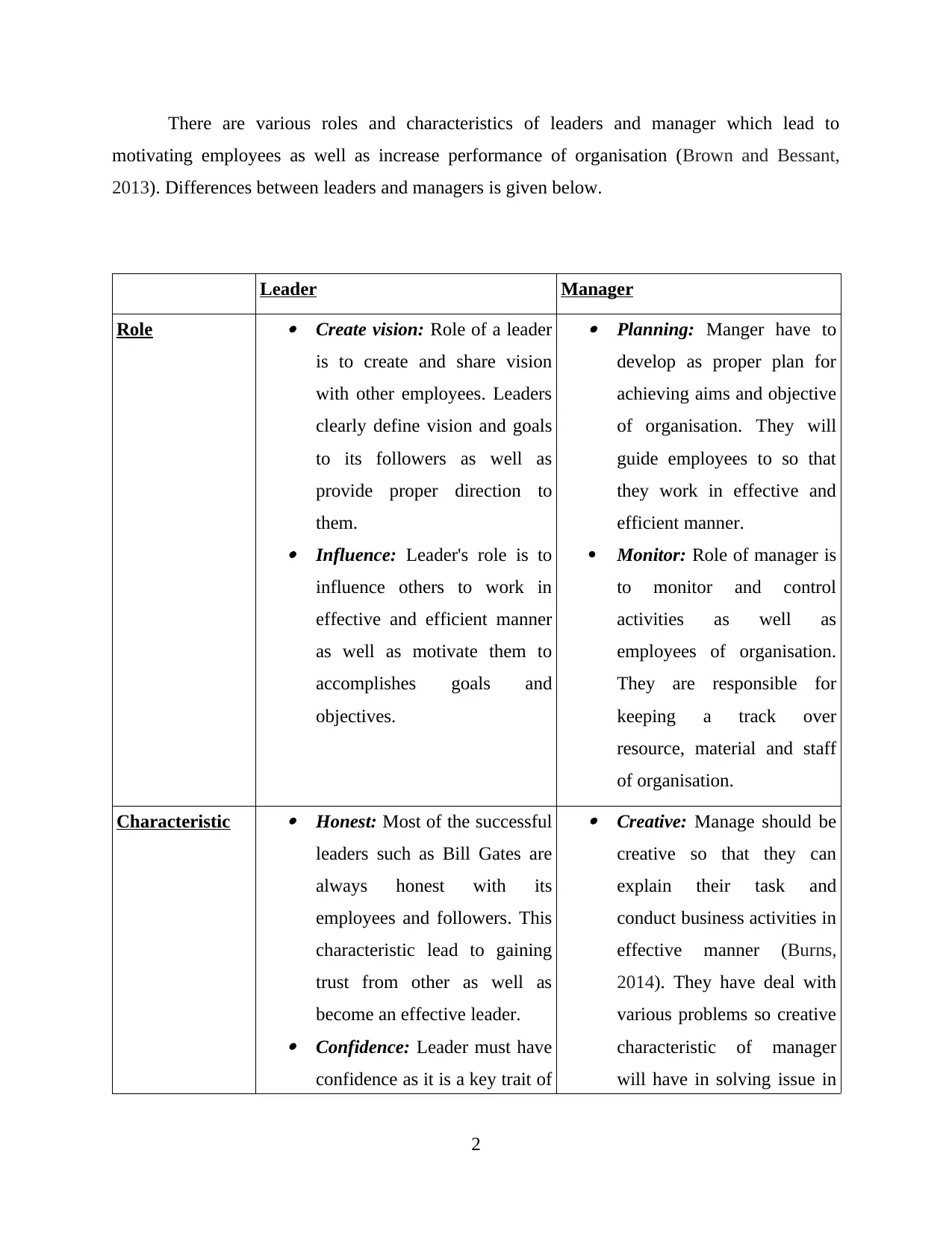
There are various roles and characteristics of leaders and manager which lead to
motivating employees as well as increase performance of organisation (Brown and Bessant,
2013). Differences between leaders and managers is given below.
Leader Manager
Role
Create vision: Role of a leader
is to create and share vision
with other employees. Leaders
clearly define vision and goals
to its followers as well as
provide proper direction to
them.
Influence: Leader's role is to
influence others to work in
effective and efficient manner
as well as motivate them to
accomplishes goals and
objectives.
Planning: Manger have to
develop as proper plan for
achieving aims and objective
of organisation. They will
guide employees to so that
they work in effective and
efficient manner.
Monitor: Role of manager is
to monitor and control
activities as well as
employees of organisation.
They are responsible for
keeping a track over
resource, material and staff
of organisation.
Characteristic
Honest: Most of the successful
leaders such as Bill Gates are
always honest with its
employees and followers. This
characteristic lead to gaining
trust from other as well as
become an effective leader.
Confidence: Leader must have
confidence as it is a key trait of
Creative: Manage should be
creative so that they can
explain their task and
conduct business activities in
effective manner (Burns,
2014). They have deal with
various problems so creative
characteristic of manager
will have in solving issue in
2
motivating employees as well as increase performance of organisation (Brown and Bessant,
2013). Differences between leaders and managers is given below.
Leader Manager
Role
Create vision: Role of a leader
is to create and share vision
with other employees. Leaders
clearly define vision and goals
to its followers as well as
provide proper direction to
them.
Influence: Leader's role is to
influence others to work in
effective and efficient manner
as well as motivate them to
accomplishes goals and
objectives.
Planning: Manger have to
develop as proper plan for
achieving aims and objective
of organisation. They will
guide employees to so that
they work in effective and
efficient manner.
Monitor: Role of manager is
to monitor and control
activities as well as
employees of organisation.
They are responsible for
keeping a track over
resource, material and staff
of organisation.
Characteristic
Honest: Most of the successful
leaders such as Bill Gates are
always honest with its
employees and followers. This
characteristic lead to gaining
trust from other as well as
become an effective leader.
Confidence: Leader must have
confidence as it is a key trait of
Creative: Manage should be
creative so that they can
explain their task and
conduct business activities in
effective manner (Burns,
2014). They have deal with
various problems so creative
characteristic of manager
will have in solving issue in
2
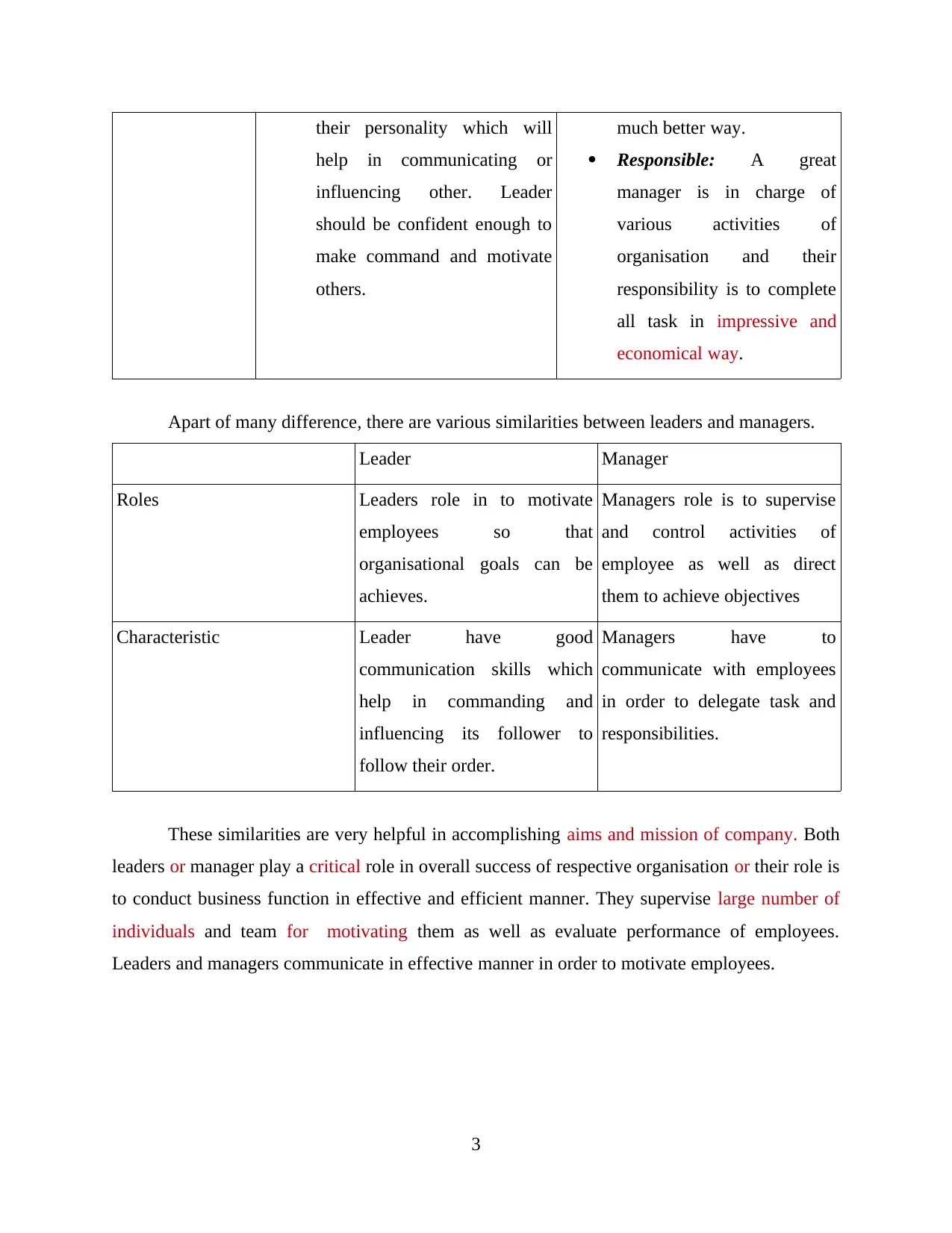
their personality which will
help in communicating or
influencing other. Leader
should be confident enough to
make command and motivate
others.
much better way.
Responsible: A great
manager is in charge of
various activities of
organisation and their
responsibility is to complete
all task in impressive and
economical way.
Apart of many difference, there are various similarities between leaders and managers.
Leader Manager
Roles Leaders role in to motivate
employees so that
organisational goals can be
achieves.
Managers role is to supervise
and control activities of
employee as well as direct
them to achieve objectives
Characteristic Leader have good
communication skills which
help in commanding and
influencing its follower to
follow their order.
Managers have to
communicate with employees
in order to delegate task and
responsibilities.
These similarities are very helpful in accomplishing aims and mission of company. Both
leaders or manager play a critical role in overall success of respective organisation or their role is
to conduct business function in effective and efficient manner. They supervise large number of
individuals and team for motivating them as well as evaluate performance of employees.
Leaders and managers communicate in effective manner in order to motivate employees.
3
help in communicating or
influencing other. Leader
should be confident enough to
make command and motivate
others.
much better way.
Responsible: A great
manager is in charge of
various activities of
organisation and their
responsibility is to complete
all task in impressive and
economical way.
Apart of many difference, there are various similarities between leaders and managers.
Leader Manager
Roles Leaders role in to motivate
employees so that
organisational goals can be
achieves.
Managers role is to supervise
and control activities of
employee as well as direct
them to achieve objectives
Characteristic Leader have good
communication skills which
help in commanding and
influencing its follower to
follow their order.
Managers have to
communicate with employees
in order to delegate task and
responsibilities.
These similarities are very helpful in accomplishing aims and mission of company. Both
leaders or manager play a critical role in overall success of respective organisation or their role is
to conduct business function in effective and efficient manner. They supervise large number of
individuals and team for motivating them as well as evaluate performance of employees.
Leaders and managers communicate in effective manner in order to motivate employees.
3
⊘ This is a preview!⊘
Do you want full access?
Subscribe today to unlock all pages.

Trusted by 1+ million students worldwide
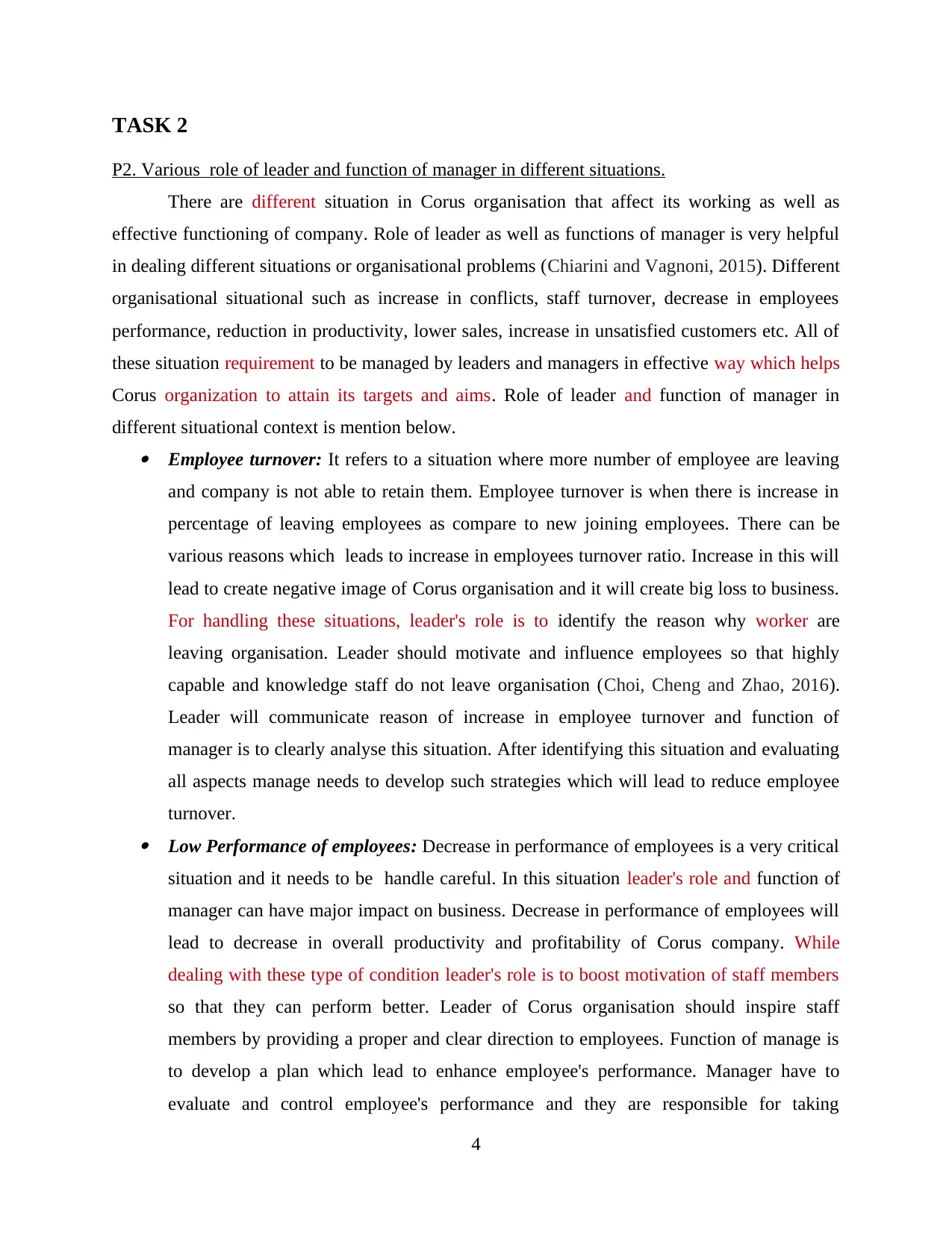
TASK 2
P2. Various role of leader and function of manager in different situations.
There are different situation in Corus organisation that affect its working as well as
effective functioning of company. Role of leader as well as functions of manager is very helpful
in dealing different situations or organisational problems (Chiarini and Vagnoni, 2015). Different
organisational situational such as increase in conflicts, staff turnover, decrease in employees
performance, reduction in productivity, lower sales, increase in unsatisfied customers etc. All of
these situation requirement to be managed by leaders and managers in effective way which helps
Corus organization to attain its targets and aims. Role of leader and function of manager in
different situational context is mention below. Employee turnover: It refers to a situation where more number of employee are leaving
and company is not able to retain them. Employee turnover is when there is increase in
percentage of leaving employees as compare to new joining employees. There can be
various reasons which leads to increase in employees turnover ratio. Increase in this will
lead to create negative image of Corus organisation and it will create big loss to business.
For handling these situations, leader's role is to identify the reason why worker are
leaving organisation. Leader should motivate and influence employees so that highly
capable and knowledge staff do not leave organisation (Choi, Cheng and Zhao, 2016).
Leader will communicate reason of increase in employee turnover and function of
manager is to clearly analyse this situation. After identifying this situation and evaluating
all aspects manage needs to develop such strategies which will lead to reduce employee
turnover. Low Performance of employees: Decrease in performance of employees is a very critical
situation and it needs to be handle careful. In this situation leader's role and function of
manager can have major impact on business. Decrease in performance of employees will
lead to decrease in overall productivity and profitability of Corus company. While
dealing with these type of condition leader's role is to boost motivation of staff members
so that they can perform better. Leader of Corus organisation should inspire staff
members by providing a proper and clear direction to employees. Function of manage is
to develop a plan which lead to enhance employee's performance. Manager have to
evaluate and control employee's performance and they are responsible for taking
4
P2. Various role of leader and function of manager in different situations.
There are different situation in Corus organisation that affect its working as well as
effective functioning of company. Role of leader as well as functions of manager is very helpful
in dealing different situations or organisational problems (Chiarini and Vagnoni, 2015). Different
organisational situational such as increase in conflicts, staff turnover, decrease in employees
performance, reduction in productivity, lower sales, increase in unsatisfied customers etc. All of
these situation requirement to be managed by leaders and managers in effective way which helps
Corus organization to attain its targets and aims. Role of leader and function of manager in
different situational context is mention below. Employee turnover: It refers to a situation where more number of employee are leaving
and company is not able to retain them. Employee turnover is when there is increase in
percentage of leaving employees as compare to new joining employees. There can be
various reasons which leads to increase in employees turnover ratio. Increase in this will
lead to create negative image of Corus organisation and it will create big loss to business.
For handling these situations, leader's role is to identify the reason why worker are
leaving organisation. Leader should motivate and influence employees so that highly
capable and knowledge staff do not leave organisation (Choi, Cheng and Zhao, 2016).
Leader will communicate reason of increase in employee turnover and function of
manager is to clearly analyse this situation. After identifying this situation and evaluating
all aspects manage needs to develop such strategies which will lead to reduce employee
turnover. Low Performance of employees: Decrease in performance of employees is a very critical
situation and it needs to be handle careful. In this situation leader's role and function of
manager can have major impact on business. Decrease in performance of employees will
lead to decrease in overall productivity and profitability of Corus company. While
dealing with these type of condition leader's role is to boost motivation of staff members
so that they can perform better. Leader of Corus organisation should inspire staff
members by providing a proper and clear direction to employees. Function of manage is
to develop a plan which lead to enhance employee's performance. Manager have to
evaluate and control employee's performance and they are responsible for taking
4
Paraphrase This Document
Need a fresh take? Get an instant paraphrase of this document with our AI Paraphraser
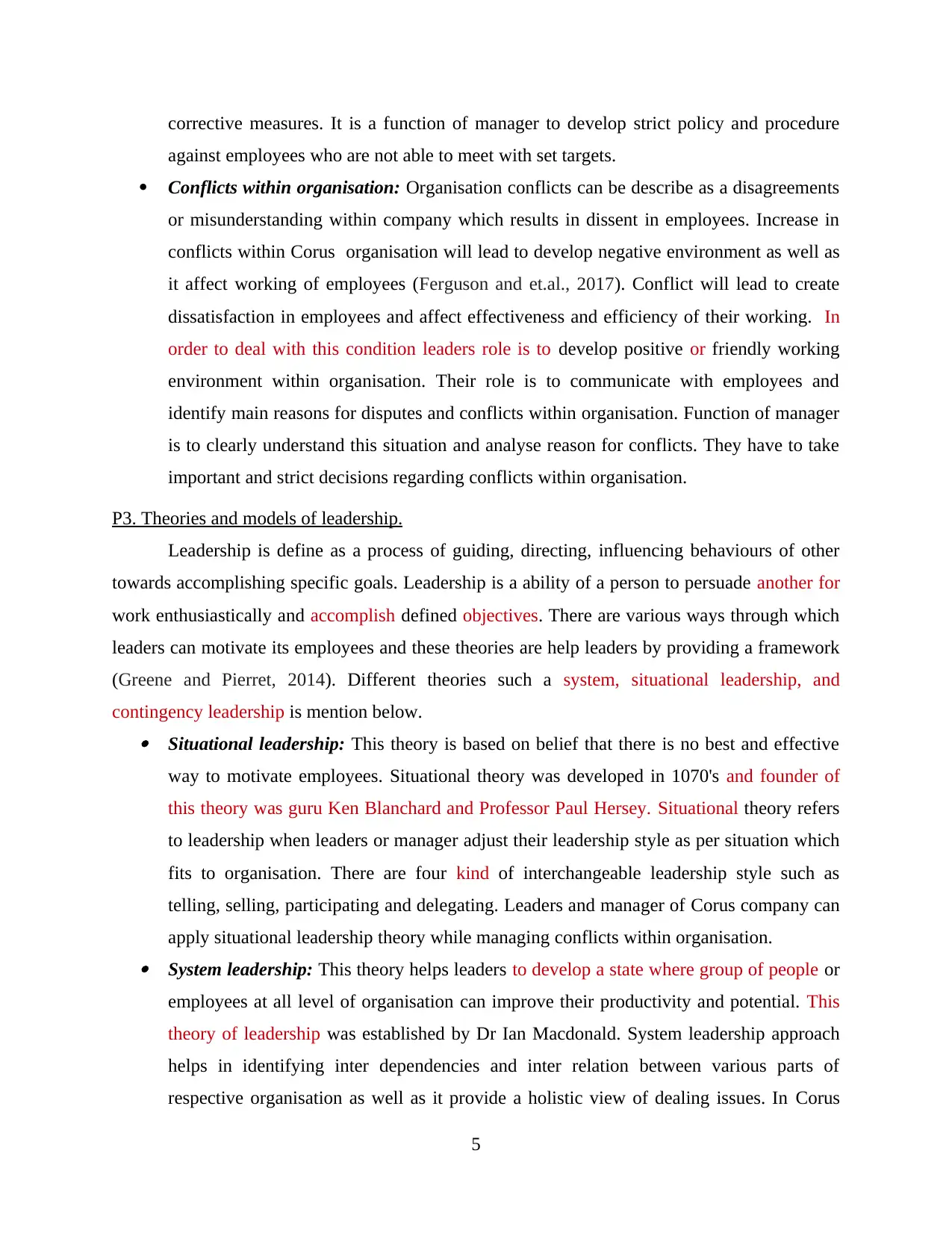
corrective measures. It is a function of manager to develop strict policy and procedure
against employees who are not able to meet with set targets.
Conflicts within organisation: Organisation conflicts can be describe as a disagreements
or misunderstanding within company which results in dissent in employees. Increase in
conflicts within Corus organisation will lead to develop negative environment as well as
it affect working of employees (Ferguson and et.al., 2017). Conflict will lead to create
dissatisfaction in employees and affect effectiveness and efficiency of their working. In
order to deal with this condition leaders role is to develop positive or friendly working
environment within organisation. Their role is to communicate with employees and
identify main reasons for disputes and conflicts within organisation. Function of manager
is to clearly understand this situation and analyse reason for conflicts. They have to take
important and strict decisions regarding conflicts within organisation.
P3. Theories and models of leadership.
Leadership is define as a process of guiding, directing, influencing behaviours of other
towards accomplishing specific goals. Leadership is a ability of a person to persuade another for
work enthusiastically and accomplish defined objectives. There are various ways through which
leaders can motivate its employees and these theories are help leaders by providing a framework
(Greene and Pierret, 2014). Different theories such a system, situational leadership, and
contingency leadership is mention below. Situational leadership: This theory is based on belief that there is no best and effective
way to motivate employees. Situational theory was developed in 1070's and founder of
this theory was guru Ken Blanchard and Professor Paul Hersey. Situational theory refers
to leadership when leaders or manager adjust their leadership style as per situation which
fits to organisation. There are four kind of interchangeable leadership style such as
telling, selling, participating and delegating. Leaders and manager of Corus company can
apply situational leadership theory while managing conflicts within organisation. System leadership: This theory helps leaders to develop a state where group of people or
employees at all level of organisation can improve their productivity and potential. This
theory of leadership was established by Dr Ian Macdonald. System leadership approach
helps in identifying inter dependencies and inter relation between various parts of
respective organisation as well as it provide a holistic view of dealing issues. In Corus
5
against employees who are not able to meet with set targets.
Conflicts within organisation: Organisation conflicts can be describe as a disagreements
or misunderstanding within company which results in dissent in employees. Increase in
conflicts within Corus organisation will lead to develop negative environment as well as
it affect working of employees (Ferguson and et.al., 2017). Conflict will lead to create
dissatisfaction in employees and affect effectiveness and efficiency of their working. In
order to deal with this condition leaders role is to develop positive or friendly working
environment within organisation. Their role is to communicate with employees and
identify main reasons for disputes and conflicts within organisation. Function of manager
is to clearly understand this situation and analyse reason for conflicts. They have to take
important and strict decisions regarding conflicts within organisation.
P3. Theories and models of leadership.
Leadership is define as a process of guiding, directing, influencing behaviours of other
towards accomplishing specific goals. Leadership is a ability of a person to persuade another for
work enthusiastically and accomplish defined objectives. There are various ways through which
leaders can motivate its employees and these theories are help leaders by providing a framework
(Greene and Pierret, 2014). Different theories such a system, situational leadership, and
contingency leadership is mention below. Situational leadership: This theory is based on belief that there is no best and effective
way to motivate employees. Situational theory was developed in 1070's and founder of
this theory was guru Ken Blanchard and Professor Paul Hersey. Situational theory refers
to leadership when leaders or manager adjust their leadership style as per situation which
fits to organisation. There are four kind of interchangeable leadership style such as
telling, selling, participating and delegating. Leaders and manager of Corus company can
apply situational leadership theory while managing conflicts within organisation. System leadership: This theory helps leaders to develop a state where group of people or
employees at all level of organisation can improve their productivity and potential. This
theory of leadership was established by Dr Ian Macdonald. System leadership approach
helps in identifying inter dependencies and inter relation between various parts of
respective organisation as well as it provide a holistic view of dealing issues. In Corus
5
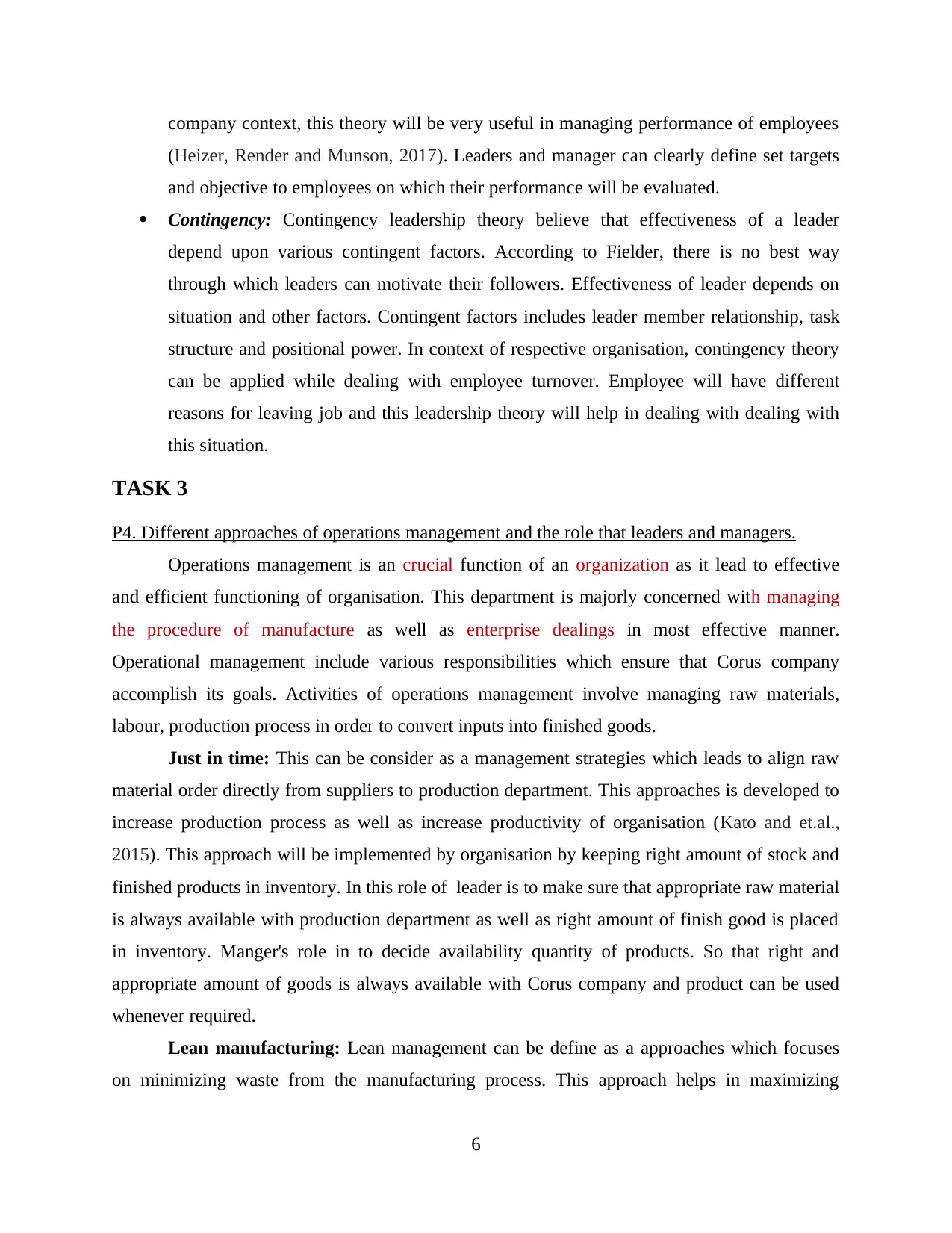
company context, this theory will be very useful in managing performance of employees
(Heizer, Render and Munson, 2017). Leaders and manager can clearly define set targets
and objective to employees on which their performance will be evaluated.
Contingency: Contingency leadership theory believe that effectiveness of a leader
depend upon various contingent factors. According to Fielder, there is no best way
through which leaders can motivate their followers. Effectiveness of leader depends on
situation and other factors. Contingent factors includes leader member relationship, task
structure and positional power. In context of respective organisation, contingency theory
can be applied while dealing with employee turnover. Employee will have different
reasons for leaving job and this leadership theory will help in dealing with dealing with
this situation.
TASK 3
P4. Different approaches of operations management and the role that leaders and managers.
Operations management is an crucial function of an organization as it lead to effective
and efficient functioning of organisation. This department is majorly concerned with managing
the procedure of manufacture as well as enterprise dealings in most effective manner.
Operational management include various responsibilities which ensure that Corus company
accomplish its goals. Activities of operations management involve managing raw materials,
labour, production process in order to convert inputs into finished goods.
Just in time: This can be consider as a management strategies which leads to align raw
material order directly from suppliers to production department. This approaches is developed to
increase production process as well as increase productivity of organisation (Kato and et.al.,
2015). This approach will be implemented by organisation by keeping right amount of stock and
finished products in inventory. In this role of leader is to make sure that appropriate raw material
is always available with production department as well as right amount of finish good is placed
in inventory. Manger's role in to decide availability quantity of products. So that right and
appropriate amount of goods is always available with Corus company and product can be used
whenever required.
Lean manufacturing: Lean management can be define as a approaches which focuses
on minimizing waste from the manufacturing process. This approach helps in maximizing
6
(Heizer, Render and Munson, 2017). Leaders and manager can clearly define set targets
and objective to employees on which their performance will be evaluated.
Contingency: Contingency leadership theory believe that effectiveness of a leader
depend upon various contingent factors. According to Fielder, there is no best way
through which leaders can motivate their followers. Effectiveness of leader depends on
situation and other factors. Contingent factors includes leader member relationship, task
structure and positional power. In context of respective organisation, contingency theory
can be applied while dealing with employee turnover. Employee will have different
reasons for leaving job and this leadership theory will help in dealing with dealing with
this situation.
TASK 3
P4. Different approaches of operations management and the role that leaders and managers.
Operations management is an crucial function of an organization as it lead to effective
and efficient functioning of organisation. This department is majorly concerned with managing
the procedure of manufacture as well as enterprise dealings in most effective manner.
Operational management include various responsibilities which ensure that Corus company
accomplish its goals. Activities of operations management involve managing raw materials,
labour, production process in order to convert inputs into finished goods.
Just in time: This can be consider as a management strategies which leads to align raw
material order directly from suppliers to production department. This approaches is developed to
increase production process as well as increase productivity of organisation (Kato and et.al.,
2015). This approach will be implemented by organisation by keeping right amount of stock and
finished products in inventory. In this role of leader is to make sure that appropriate raw material
is always available with production department as well as right amount of finish good is placed
in inventory. Manger's role in to decide availability quantity of products. So that right and
appropriate amount of goods is always available with Corus company and product can be used
whenever required.
Lean manufacturing: Lean management can be define as a approaches which focuses
on minimizing waste from the manufacturing process. This approach helps in maximizing
6
⊘ This is a preview!⊘
Do you want full access?
Subscribe today to unlock all pages.

Trusted by 1+ million students worldwide
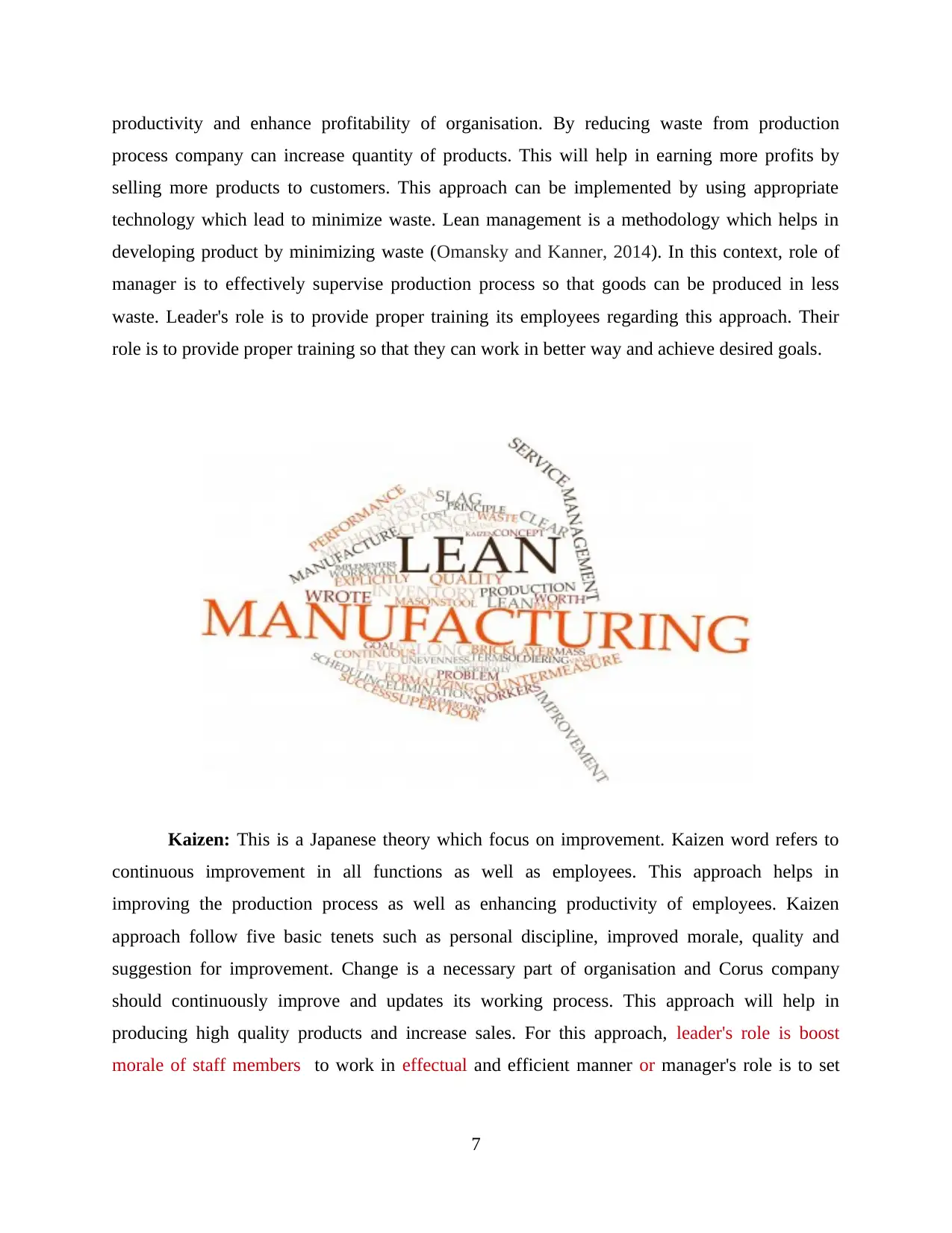
productivity and enhance profitability of organisation. By reducing waste from production
process company can increase quantity of products. This will help in earning more profits by
selling more products to customers. This approach can be implemented by using appropriate
technology which lead to minimize waste. Lean management is a methodology which helps in
developing product by minimizing waste (Omansky and Kanner, 2014). In this context, role of
manager is to effectively supervise production process so that goods can be produced in less
waste. Leader's role is to provide proper training its employees regarding this approach. Their
role is to provide proper training so that they can work in better way and achieve desired goals.
Kaizen: This is a Japanese theory which focus on improvement. Kaizen word refers to
continuous improvement in all functions as well as employees. This approach helps in
improving the production process as well as enhancing productivity of employees. Kaizen
approach follow five basic tenets such as personal discipline, improved morale, quality and
suggestion for improvement. Change is a necessary part of organisation and Corus company
should continuously improve and updates its working process. This approach will help in
producing high quality products and increase sales. For this approach, leader's role is boost
morale of staff members to work in effectual and efficient manner or manager's role is to set
7
process company can increase quantity of products. This will help in earning more profits by
selling more products to customers. This approach can be implemented by using appropriate
technology which lead to minimize waste. Lean management is a methodology which helps in
developing product by minimizing waste (Omansky and Kanner, 2014). In this context, role of
manager is to effectively supervise production process so that goods can be produced in less
waste. Leader's role is to provide proper training its employees regarding this approach. Their
role is to provide proper training so that they can work in better way and achieve desired goals.
Kaizen: This is a Japanese theory which focus on improvement. Kaizen word refers to
continuous improvement in all functions as well as employees. This approach helps in
improving the production process as well as enhancing productivity of employees. Kaizen
approach follow five basic tenets such as personal discipline, improved morale, quality and
suggestion for improvement. Change is a necessary part of organisation and Corus company
should continuously improve and updates its working process. This approach will help in
producing high quality products and increase sales. For this approach, leader's role is boost
morale of staff members to work in effectual and efficient manner or manager's role is to set
7
Paraphrase This Document
Need a fresh take? Get an instant paraphrase of this document with our AI Paraphraser
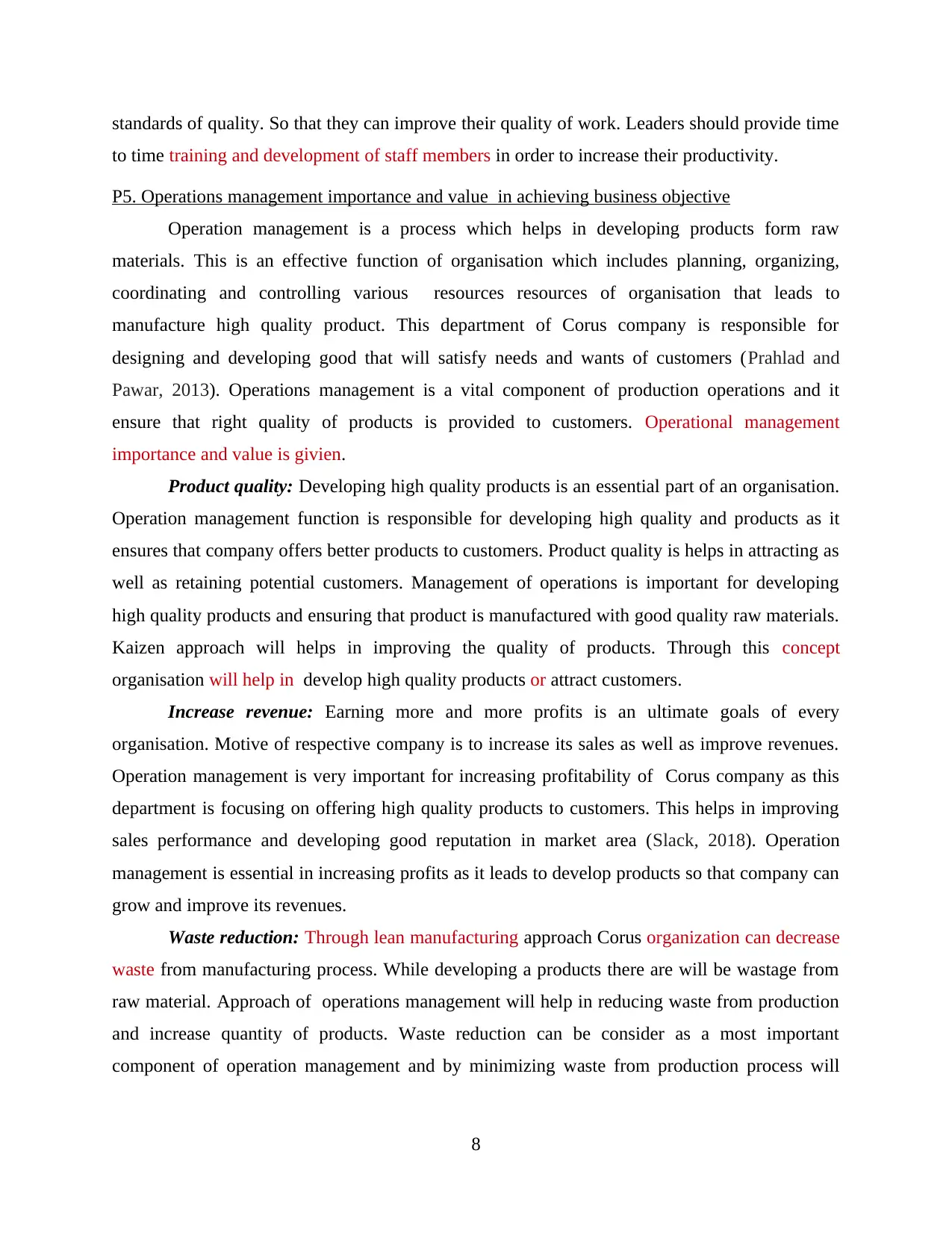
standards of quality. So that they can improve their quality of work. Leaders should provide time
to time training and development of staff members in order to increase their productivity.
P5. Operations management importance and value in achieving business objective
Operation management is a process which helps in developing products form raw
materials. This is an effective function of organisation which includes planning, organizing,
coordinating and controlling various resources resources of organisation that leads to
manufacture high quality product. This department of Corus company is responsible for
designing and developing good that will satisfy needs and wants of customers (Prahlad and
Pawar, 2013). Operations management is a vital component of production operations and it
ensure that right quality of products is provided to customers. Operational management
importance and value is givien.
Product quality: Developing high quality products is an essential part of an organisation.
Operation management function is responsible for developing high quality and products as it
ensures that company offers better products to customers. Product quality is helps in attracting as
well as retaining potential customers. Management of operations is important for developing
high quality products and ensuring that product is manufactured with good quality raw materials.
Kaizen approach will helps in improving the quality of products. Through this concept
organisation will help in develop high quality products or attract customers.
Increase revenue: Earning more and more profits is an ultimate goals of every
organisation. Motive of respective company is to increase its sales as well as improve revenues.
Operation management is very important for increasing profitability of Corus company as this
department is focusing on offering high quality products to customers. This helps in improving
sales performance and developing good reputation in market area (Slack, 2018). Operation
management is essential in increasing profits as it leads to develop products so that company can
grow and improve its revenues.
Waste reduction: Through lean manufacturing approach Corus organization can decrease
waste from manufacturing process. While developing a products there are will be wastage from
raw material. Approach of operations management will help in reducing waste from production
and increase quantity of products. Waste reduction can be consider as a most important
component of operation management and by minimizing waste from production process will
8
to time training and development of staff members in order to increase their productivity.
P5. Operations management importance and value in achieving business objective
Operation management is a process which helps in developing products form raw
materials. This is an effective function of organisation which includes planning, organizing,
coordinating and controlling various resources resources of organisation that leads to
manufacture high quality product. This department of Corus company is responsible for
designing and developing good that will satisfy needs and wants of customers (Prahlad and
Pawar, 2013). Operations management is a vital component of production operations and it
ensure that right quality of products is provided to customers. Operational management
importance and value is givien.
Product quality: Developing high quality products is an essential part of an organisation.
Operation management function is responsible for developing high quality and products as it
ensures that company offers better products to customers. Product quality is helps in attracting as
well as retaining potential customers. Management of operations is important for developing
high quality products and ensuring that product is manufactured with good quality raw materials.
Kaizen approach will helps in improving the quality of products. Through this concept
organisation will help in develop high quality products or attract customers.
Increase revenue: Earning more and more profits is an ultimate goals of every
organisation. Motive of respective company is to increase its sales as well as improve revenues.
Operation management is very important for increasing profitability of Corus company as this
department is focusing on offering high quality products to customers. This helps in improving
sales performance and developing good reputation in market area (Slack, 2018). Operation
management is essential in increasing profits as it leads to develop products so that company can
grow and improve its revenues.
Waste reduction: Through lean manufacturing approach Corus organization can decrease
waste from manufacturing process. While developing a products there are will be wastage from
raw material. Approach of operations management will help in reducing waste from production
and increase quantity of products. Waste reduction can be consider as a most important
component of operation management and by minimizing waste from production process will
8
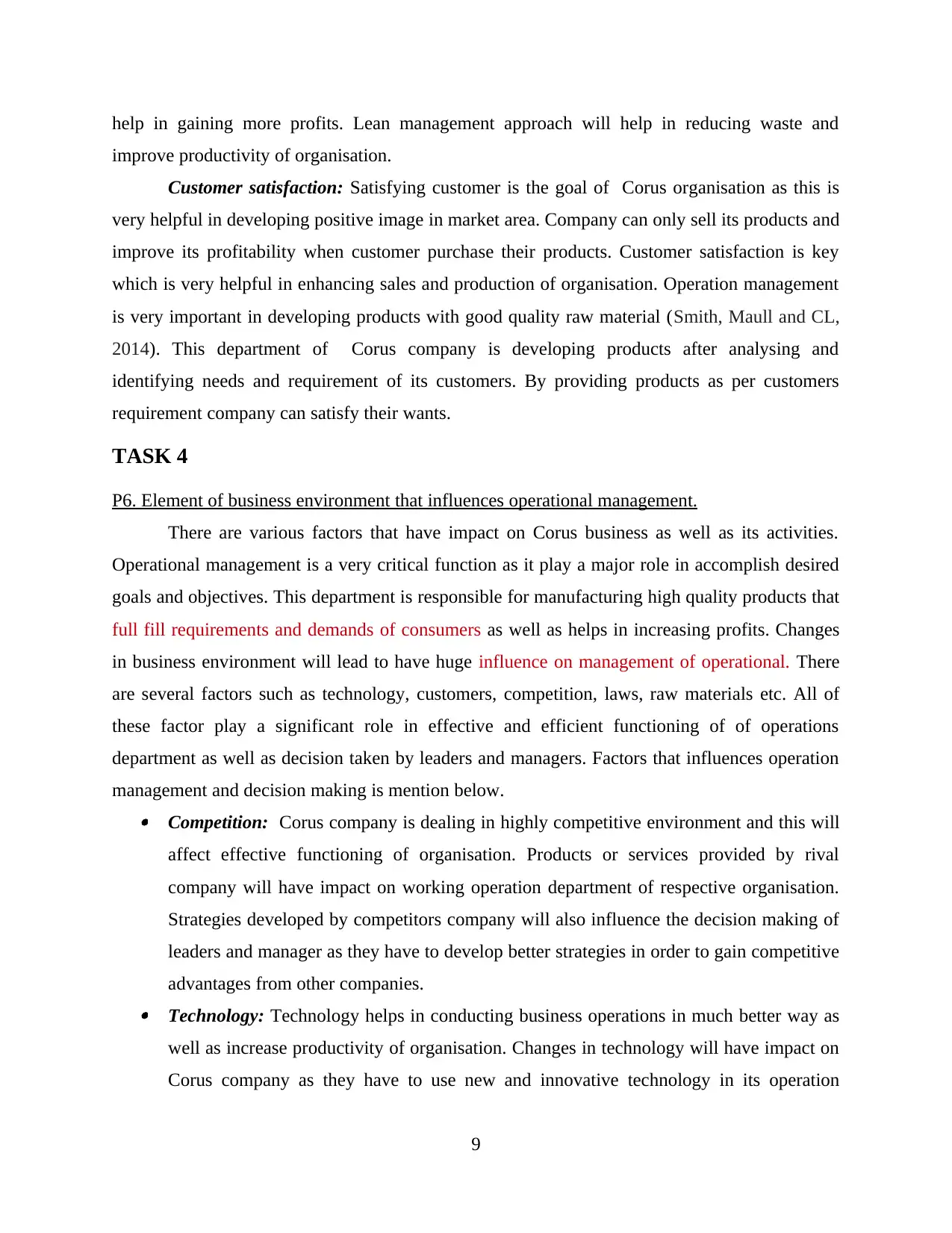
help in gaining more profits. Lean management approach will help in reducing waste and
improve productivity of organisation.
Customer satisfaction: Satisfying customer is the goal of Corus organisation as this is
very helpful in developing positive image in market area. Company can only sell its products and
improve its profitability when customer purchase their products. Customer satisfaction is key
which is very helpful in enhancing sales and production of organisation. Operation management
is very important in developing products with good quality raw material (Smith, Maull and CL,
2014). This department of Corus company is developing products after analysing and
identifying needs and requirement of its customers. By providing products as per customers
requirement company can satisfy their wants.
TASK 4
P6. Element of business environment that influences operational management.
There are various factors that have impact on Corus business as well as its activities.
Operational management is a very critical function as it play a major role in accomplish desired
goals and objectives. This department is responsible for manufacturing high quality products that
full fill requirements and demands of consumers as well as helps in increasing profits. Changes
in business environment will lead to have huge influence on management of operational. There
are several factors such as technology, customers, competition, laws, raw materials etc. All of
these factor play a significant role in effective and efficient functioning of of operations
department as well as decision taken by leaders and managers. Factors that influences operation
management and decision making is mention below. Competition: Corus company is dealing in highly competitive environment and this will
affect effective functioning of organisation. Products or services provided by rival
company will have impact on working operation department of respective organisation.
Strategies developed by competitors company will also influence the decision making of
leaders and manager as they have to develop better strategies in order to gain competitive
advantages from other companies. Technology: Technology helps in conducting business operations in much better way as
well as increase productivity of organisation. Changes in technology will have impact on
Corus company as they have to use new and innovative technology in its operation
9
improve productivity of organisation.
Customer satisfaction: Satisfying customer is the goal of Corus organisation as this is
very helpful in developing positive image in market area. Company can only sell its products and
improve its profitability when customer purchase their products. Customer satisfaction is key
which is very helpful in enhancing sales and production of organisation. Operation management
is very important in developing products with good quality raw material (Smith, Maull and CL,
2014). This department of Corus company is developing products after analysing and
identifying needs and requirement of its customers. By providing products as per customers
requirement company can satisfy their wants.
TASK 4
P6. Element of business environment that influences operational management.
There are various factors that have impact on Corus business as well as its activities.
Operational management is a very critical function as it play a major role in accomplish desired
goals and objectives. This department is responsible for manufacturing high quality products that
full fill requirements and demands of consumers as well as helps in increasing profits. Changes
in business environment will lead to have huge influence on management of operational. There
are several factors such as technology, customers, competition, laws, raw materials etc. All of
these factor play a significant role in effective and efficient functioning of of operations
department as well as decision taken by leaders and managers. Factors that influences operation
management and decision making is mention below. Competition: Corus company is dealing in highly competitive environment and this will
affect effective functioning of organisation. Products or services provided by rival
company will have impact on working operation department of respective organisation.
Strategies developed by competitors company will also influence the decision making of
leaders and manager as they have to develop better strategies in order to gain competitive
advantages from other companies. Technology: Technology helps in conducting business operations in much better way as
well as increase productivity of organisation. Changes in technology will have impact on
Corus company as they have to use new and innovative technology in its operation
9
⊘ This is a preview!⊘
Do you want full access?
Subscribe today to unlock all pages.

Trusted by 1+ million students worldwide
1 out of 15
Related Documents
Your All-in-One AI-Powered Toolkit for Academic Success.
+13062052269
info@desklib.com
Available 24*7 on WhatsApp / Email
![[object Object]](/_next/static/media/star-bottom.7253800d.svg)
Unlock your academic potential
Copyright © 2020–2026 A2Z Services. All Rights Reserved. Developed and managed by ZUCOL.





